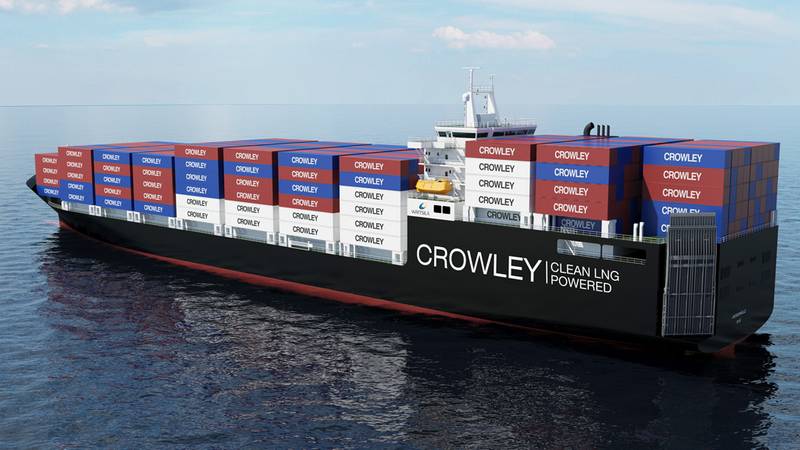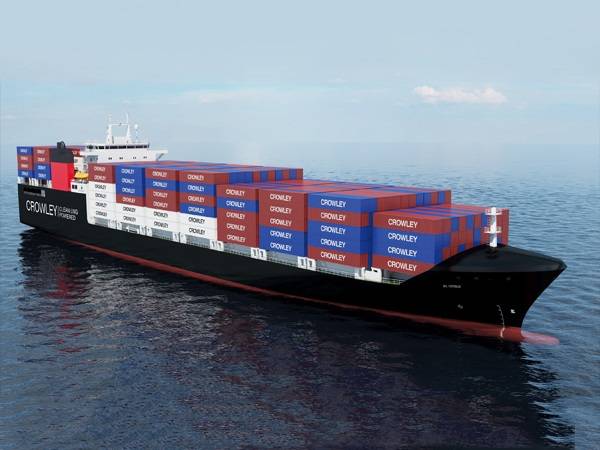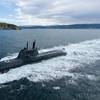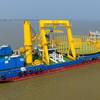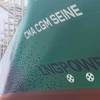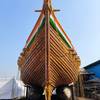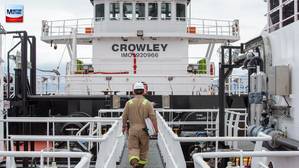Crowley to Build Revolutionary LNG-Powered ConRo Ships for U.S. – Puerto Rico Trade
Commitment Class Jones-Act Ships to Offer Lower Emissions; Increased Speed, Reliability and Capacity, and Optimized Vehicle Shipping Decks.
The next chapter in Crowley’s storied history of shipping and logistics services between the United States mainland and Puerto Rico will be written with larger, faster and environmentally-friendly liquefied natural gas (LNG)-powered, combination container – Roll-On/Roll-Off (ConRo) ships.
Crowley today announced that it has signed a contract with VT Halter Marine Inc., of Pascagoula, Miss., to build two of the world’s first LNG-powered ConRo ships, which are designed to travel at speeds up to 22 knots and carry containers ranging in size from 20-foot standard to 53-foot-long, 102-inch-wide, high-capacity units, along with hundreds of vehicles in enclosed, weather-tight car decking.
The Commitment Class, Jones Act ships, scheduled for delivery in second and fourth quarter 2017, will replace Crowley’s towed triple-deck barge fleet, which has served the trade continuously and with distinction since the early 1970s. These new ships, which will be named El Coquí (ko-kee) and Taíno (tahy-noh), will offer customers fast ocean transit times, while accommodating the company’s diverse equipment selection and cargo handling flexibility – benefits customers have enjoyed for nearly 60 years.
El Coquí is the common name for several species of small frogs that are native to Puerto Rico, and Taíno were native Puerto Ricans who lived off the land and who had great appreciation and respect for their environment. Adopting these ship names is an acknowledgement of the subjects’ enduring importance within Puerto Rico’s diverse ecology and heritage as well as symbols of Crowley’s commitment to help protect the environment. Powered by LNG, the Crowley ships will set a new standard for environmentally responsible shipping.
LNG is a stable gas that is neither toxic nor corrosive and is lighter than air. It is the cleanest fossil fuel available, netting a 100-percent reduction in sulphur oxide (SOx) and particulate matter (PM), and a 92-percent reduction in nitrogen oxide (NOx). LNG also has the ability to significantly reduce carbon dioxide (CO2), a contributor to greenhouse gas emissions, as compared with conventional fossil fuels. “Our investment in these new ships – the first of their kind in the world – is significant on so many fronts,” said Tom Crowley, company chairman and CEO. “We named them the Commitment Class of ships because they represent our commitment to our customers and the people of Puerto Rico whom we will continue to serve for years to come with the superior service they expect from Crowley.”
“Second, it reflects Crowley’s commitment to EcoStewardship© in that we are developing and using best-available technology that allows for improved emissions, advanced ballast water management and alternative fuel selection,” he said. “And lastly, our actions are clear evidence of our commitment to the U.S. maritime industry and the Jones Act. American built, crewed and owned ensures U.S. shipbuilding capabilities, skilled U.S. merchant seamen, and available domestic vessel tonnage, all of which are of vital importance to our national defense.”
The vessel design has been brought to life by Warstila Ship Design in conjunction with Crowley subsidiary Jensen Maritime, a leading Seattle-based naval architecture and marine engineering firm. The new double-hulled ConRo ships have been designed to maximize the carriage of 102-inch-wide containers, which offer the most cubic cargo capacity in the trade. The ships will be 219.5 meters long, 32.3 meters wide (beam), have a deep draft of 10 meters, and an approximate deadweight capacity of 26,500 metric tonnes. Cargo capacity will be approximately 2,400 TEUs (20-foot-equivalent-units), with additional space for nearly 400 vehicles. The main propulsion and auxiliary engines will be fueled with LNG.
Jensen will also provide construction management and supervision in the shipyard throughout the building phase. “When we sat down with Jensen and Wartsila to design these ships, we started with a clean slate to address and incorporate the specific needs of the Puerto Rico market,” said John Hourihan, senior vice president and general manager, Puerto Rico and Caribbean services. “We are very excited to add faster transit times to our existing service offerings while maintaining our ability to handle 53-foot and refrigerated equipment that so many of our customers have come to rely on.”
“We also understand what our car customers want, so we are pleased that these vessels will be the only ones in the trade to offer vehicle transportation in completely-enclosed, ventilated, weather-tight decks,” he said. “Coupled with the LNG fuel, customers can take satisfaction in that they are getting faster, more reliable service, while reducing the amount of CO2 emissions attributable to each container by approximately 38 percent. This design is a win-win for the customer and for the environment.”
“Safety and environmental protection were also at the forefront of our design process,” said Johan Sperling, Jensen vice present. “For example, one of the superior safety systems we engineered included a feature that places all fuel tanks behind double-wall voids with no exposure to the environment.”
Additionally, Sperling said the ships will meet or exceed all regulatory requirements and have the CLEAN notation, which requires limitation of operational emissions and discharges, as well as the Green Passport, both issued by classification society Det Norske Veritas (DNV).
Designing, building and operating LNG powered vessels is very much in line with Crowley’s overall EcoStewardship positioning and growth strategy. The company formed an LNG services group earlier this year to bring together the company’s extensive resources to provide LNG vessel design and construction management; transportation; product sales and distribution, and full-scale, project management solutions.





